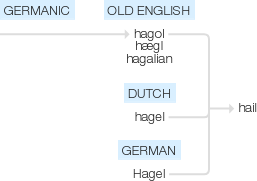Hail
Old English hagol, hægl (noun), hagalian (verb), of Germanic origin; related to Dutch hagel and German Hagel .
wiktionary
From Middle English hayle, haile, hail, from Old English hæġl, hæġel, from Proto-Germanic *haglaz (compare West Frisian heil, Low German Hagel, Dutch hagel, German Hagel, Danish hagl). Either from Proto-Indo-European *kagʰlos(“pebble”), or from *ḱoḱló-, a reduplication of *ḱel-(“cold”) (compare Old Norse héla(“frost”)).
Root-cognates outside of Germanic include Welsh caill(“testicle”), Breton kell(“testicle”), Lithuanian šešėlis(“shade, shadow”), Ancient Greek κάχληξ(kákhlēx, “pebble”), Albanian çakëll(“pebble”), Sanskrit शिशिर(śíśira, “cool, cold”).
From Middle English heil(“healthy, sound”), from Old Norse heill, from Proto-Germanic *hailaz(“whole, entire, healthy”). The verb is from Middle English heilen, itself from the adjective. Doublet of whole and hale.
etymonline
hail (interj.)
salutation in greeting, c. 1200, from Old Norse heill "health, prosperity, good luck," or a similar Scandinavian source, and in part from Old English shortening of wæs hæil "be healthy" (see health; and compare wassail).
The interj. hail is thus an abbreviated sentence expressing a wish, 'be whole,' i. e., be in good health, and equiv. to L. salve, plural salvete, or ave, plural avete .... [Century Dictionary]
hail (n.)
"frozen rain, pellets of ice falling in showers," Old English hægl, hagol (Mercian hegel) "hail, hailstorm," also the name of the rune for H, from Proto-Germanic *haglaz (source also of Old Frisian heil, Old Saxon, Old High German hagal, Old Norse hagl, German Hagel "hail"), probably from PIE *kaghlo- "pebble" (source also of Greek kakhlex "round pebble").
hail (v.1)
"to greet or address with 'hail!,'" also "to drink toasts," c. 1200, heilen; to call to from a distance," 1560s (in this sense originally nautical), from hail (interj.). Related: Hailed; hailing. Bartlett ["Dictionary of Americanisms," 1848] identifies to hail from (1841) as "a phrase probably originating with seamen or boatmen." Hail fellow well met is from 1580s as a descriptive adjective, from a familiar greeting; hail fellow (adj.) "overly familiar" is from 1570s. Hail Mary (c. 1300) is the angelic salutation (Latin ave Maria) in Luke i.58, used as a devotional recitation. As a desperation play in U.S. football, attested by 1940. "Hail, Columbia," the popular patriotic song, also was a euphemism for "hell" in American English slang from c. 1850-1910.
hail (v.2)
Old English hagalian "to fall as hail," from root of hail (n.). Related: Hailed; hailing. Figurative use from mid-15c.
